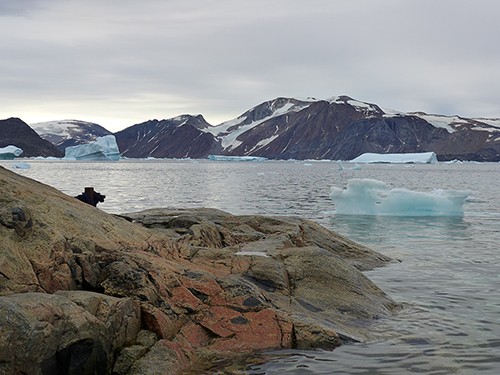By Ana Verayo, | December 09, 2016

Icebergs discharged from Allison Glacier float near Kullorsuaq, western Greenland. (Margie Turrin/Lamont-Doherty Earth Observatory)
While Greenland is 80 percent covered in ice today, scientists say that the massive Danish nation was green and devoid of ice sheets some 1.1 million years ago.
During the Pleistocene period that spanned 2.59 million years to 11,700 years ago, Greenland was virtually ice-free for 280,000 years.
Like Us on Facebook
A team from Columbia University's Lamont-Doherty Earth Observatory have successfully identified that this period occurred about 1.4 million to 1.1 million years ago.
The team studied and analyzed core samples from bedrock that was drilled from the Greenland ice sheet at 10,000 feet below in 1993. The team was able to do this as new technology have been developed to correctly date this core sample.
The team's findings reveal traces of radioactive material from deep space specifically beryllium-10 and aluminum-26 isotopes, which crashed into Earth in asteroids or meteorites. By calculating the decay rate of this material, scientists were able to identify the time when Greenland was free from ice.
MOST OF GREENLAND ICE MELTED TO BEDROCK IN RECENT GEOLOGIC PAST, SAYS STUDY from Columbia University News on Vimeo.
This study also aims to calculate the total amount of ice in Greenland if it all melts. Since Greenland's ice sheet is measured at 684,000 cubic miles, if it all melts, global sea levels will rise by 24 feet or about two-storeys high.
According to paleoclimatologist Joerg Schaefer of Columbia University, this new data presents a bleak future for the Greenland ice sheet, showing that it is highly unstable. If the ice cover was lost in the past, it could happen again.
Most current models suggest that Greenland has been covered in ice for the last 1 million years. However, these new findings challenge this idea.
The team concluded that there is clear evidence that Greenland lost its ice cover due to natural climate cycles, and man-made climate change and global warming can aggravate this. Recent studies suggest that 1 trillion tons of ice have already disappeared from the country.
Schaefer added that it is crucial to understand how exactly Greenland's ice sheet works, specifically how this system works and we need to find out fast.
This new study was published in the journal Nature.
-
Use of Coronavirus Pandemic Drones Raises Privacy Concerns: Drones Spread Fear, Local Officials Say

-
Coronavirus Hampers The Delivery Of Lockheed Martin F-35 Stealth Fighters For 2020

-
Instagram Speeds Up Plans to Add Account Memorialization Feature Due to COVID-19 Deaths

-
NASA: Perseverance Plans to Bring 'Mars Rock' to Earth in 2031

-
600 Dead And 3,000 In The Hospital as Iranians Believed Drinking High-Concentrations of Alcohol Can Cure The Coronavirus

-
600 Dead And 3,000 In The Hospital as Iranians Believed Drinking High-Concentrations of Alcohol Can Cure The Coronavirus

-
COVID-19: Doctors, Nurses Use Virtual Reality to Learn New Skills in Treating Coronavirus Patients







